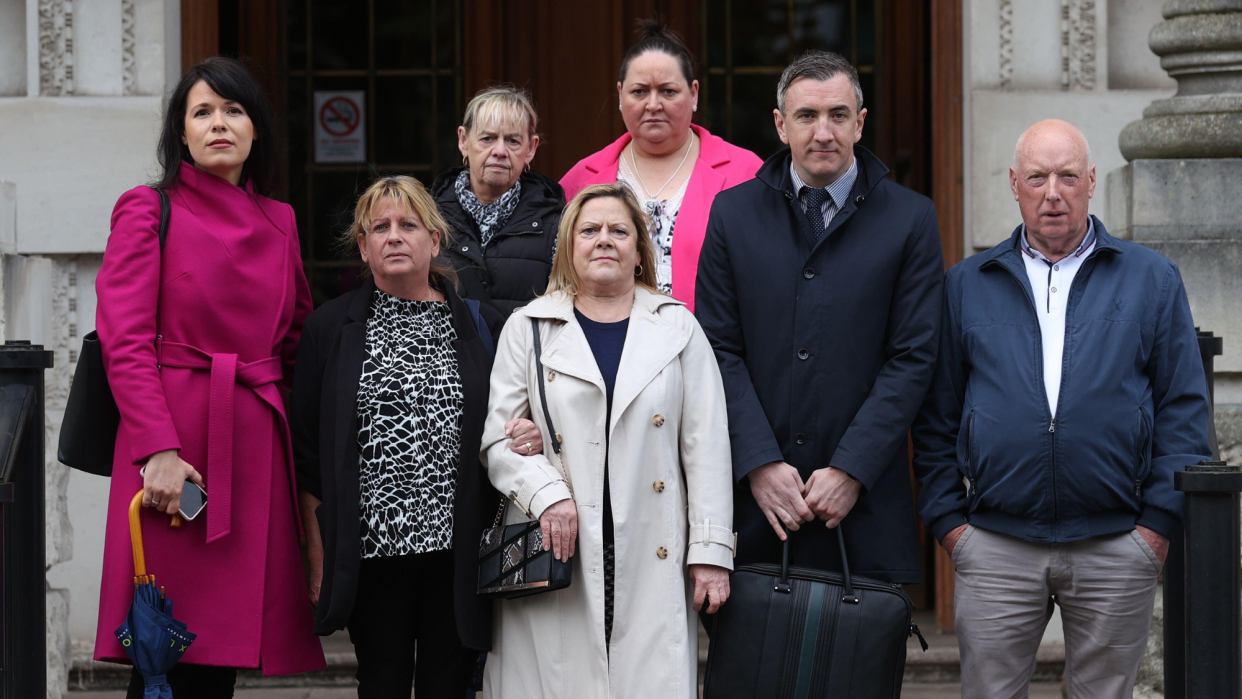Why the Troubles Act faces a legal challenge in Belfast

- Oops!Something went wrong.Please try again later.
The High Court in Belfast is hearing a legal challenge against a controversial new act of parliament that will stop future prosecutions regarding crimes committed during the Troubles.
When the Northern Ireland Troubles (Legacy and Reconciliation) Bill was announced in July 2021, the then prime minister Boris Johnson said it would allow Northern Ireland to "draw a line under the Troubles".
But the country's main political parties, the Irish government and families of Troubles' victims believe it will only cause further harm.
What does the act say?
The act, which received royal assent in September, is an "attempt to resolve" the ongoing open investigations into murders committed during the 30 years of conflict between 1968 and 1998, Samantha Twietmeyer, of Queen's University in Ontario, wrote on The Conversation. More than 3,500 people died during that time.
Police investigations into Troubles-related crimes will be transferred to a newly created Independent Commission for Reconciliation and Information Recovery (ICRIR). The legislation will prevent victims' families from seeking further inquests or civil cases.
The ICRIR will also have the power to grant perpetrators immunity from prosecution on the condition they cooperate with the commission's investigations into events under review.
Why has the legislation proved controversial?
The Police Ombudsman for Northern Ireland's Historical Investigations directorate currently has "around 450 Troubles-linked complaints on its books", said The Irish News. "It estimates that it may only be able to report on up to 70 of those by May", when the ICRIR will take over managing investigations.
Hundreds of Troubles victims' families have this month been informed by the ombudsman that the investigations into their cases will be brought to an end before the change comes into effect.
The Council of Europe, which monitors its 46 member states' compliance with the European Convention on Human Rights, has warned that providing immunity from prosecution "risks breaching obligations under Article 2 of the European Convention to prosecute and punish serious grave breaches of human rights". It has "strongly urged" the government to reconsider the condition.
British military personnel are also "subject to a number of open investigations" in relation to the Troubles, said Twietmeyer on The Conversation. "In simultaneously applying amnesty and closing investigations", the act could "prevent the truth of government's culpability coming out".
What has the reaction been?
The act has been "strenuously opposed by victims' groups", said The Irish News, and – "in a rare display of unanimity" – by Northern Ireland's main political parties.
In August, Sinn Féin's deputy leader Michelle O'Neill described Westminster's proposed legislation as a "denial of human rights of victims and their families". Last month, the DUP's Emma Little-Pengelly described the act as an "affront to justice".
The legislation also faced "significant opposition" in Westminster, and from the Irish government. Leo Varadkar, the Taoiseach, has said the UK government's plan is "the wrong way to go about dealing with legacy issues in Northern Ireland". But the Conservatives "pressed ahead" with what many considered a "deeply flawed plan", said The Irish News.
Speaking in the House of Commons in September, Northern Ireland Secretary Chris Heaton-Harris said: "We must be honest about what we can realistically deliver for people in circumstances where the prospects of achieving justice in the traditional sense are so vanishingly small."
What will happen next?
Mr Justice Colton has said that Belfast High Court's "primary focus" during the hearing, which is expected to last five days, will be on the assertion that parts of the act violate the European Convention on Human Rights, said the Belfast Telegraph. The judicial challenge will also examine the creation of the ICRIR, and the end of police investigations, inquests and civil proceedings.
The Irish government has sought legal advice on raising a further judicial challenge against Westminster in the European Court of Human Rights. Should it choose to pursue such action, it "could put a vastly improved bilateral relationship under strain" once again, said the Financial Times.
In January, Labour leader Keir Starmer said that the then draft legislation indicated "how far this Conservative government in recent years has moved from a genuine understanding of the principles of the Good Friday Agreement".
Hilary Benn, the shadow Northern Ireland secretary, said in September that Labour would repeal the legislation if it were to win the next general election. "It would be useful," said The Irish News, "to hear more from Mr Benn about what that will mean in practice."

